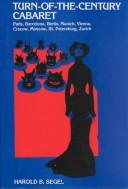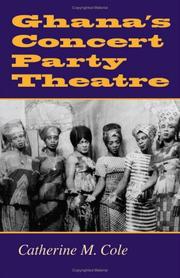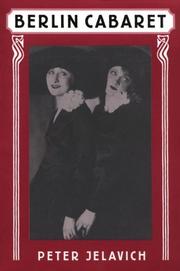| Listing 1 - 10 of 20 | << page >> |
Sort by
|

ISBN: 023105128X 9780231051286 Year: 1987 Publisher: New York Columbia University Press
Abstract | Keywords | Export | Availability | Bookmark
 Loading...
Loading...Choose an application
- Reference Manager
- EndNote
- RefWorks (Direct export to RefWorks)
Music-halls (Variety-theaters, cabarets, etc.) --- Cabarets --- Café theater --- Concert gardens --- Concert rooms --- Concert saloons --- Variety shows (Theater) --- Variety-theaters --- Theaters --- Vaudeville --- History
Book
ISBN: 0472904094 0472051229 Year: 2010 Publisher: Ann Arbor : University of Michigan Press,
Abstract | Keywords | Export | Availability | Bookmark
 Loading...
Loading...Choose an application
- Reference Manager
- EndNote
- RefWorks (Direct export to RefWorks)
"Out of a small, hand-to-mouth, women's theater collective called the WOW Cafe located on the lower east side of Manhattan, there emerged some of the most important theater troupes and performance artists of the 1980s and 1990s, including the Split Britches Company, the Five Lesbian Brothers, Carmelita Tropicana, Holly Hughes, Lisa Kron, Deb Margolin, Reno, Peggy Shaw, and Lois Weaver. The WOW (Women's One World) Cafe Theatre appeared on the cultural scene at a critical turning point in both the women's movement and feminist theory, putting a witty, hilarious, gender-bending and erotically charged aesthetic on the stage for women in general and lesbians in particular. The storefront that became the WOW Cafe Theatre saw dozens of excitingly original and enormously funny performances created, performed, and turned over at lightning speed--a kind of "hit and run" theater. As the demands on the space increased, the women behind WOW organized as a collective and moved their theater to an abandoned doll factory where it continues to operate today. For three decades the WOW Cafe has nurtured fledgling women writers, designers, and performers who continue to create important performance work. This book provides a critical history of this avant-garde venture whose ongoing "system of anarchy" has been largely responsible for its thirty-year staying power, after dozens of other women's theaters have collapsed. WOW artists were creating a wholly original cultural landscape across which women could represent themselves on their own terms. Parody, cross-dressing, zany comedy, and an unbridled eroticism are hallmarks of WOW's aesthetic, combined--importantly and powerfully--with a presumptive address to the audience as if everyone onstage, in the audience, and in the world is lesbian. The author's research included in-depth interviews with WOW veterans; newspaper reviews of the earliest productions; and rare, unpublished photographs. The book also includes a chronology of productions that have highlighted WOW's performance schedule since the early '80s."--Publisher
Lesbian theater --- Music-halls (Variety-theaters, cabarets, etc.) --- Lesbian theater. --- Theâtre lesbien --- History --- WOW Cafe Theatre (New York, N.Y.) --- New York (State) --- Cabarets --- Café theater --- Concert gardens --- Concert rooms --- Concert saloons --- Variety shows (Theater) --- Variety-theaters --- Theaters --- Vaudeville --- Gay theater --- Women's One World Café Theatre (New York, N.Y.) --- WOW Café Theater (New York, N.Y.) --- WOW --- New York (City)
Book
ISBN: 3030479412 9783030479411 3030479404 Year: 2020 Publisher: Cham, Switzerland : Palgrave Macmillan,
Abstract | Keywords | Export | Availability | Bookmark
 Loading...
Loading...Choose an application
- Reference Manager
- EndNote
- RefWorks (Direct export to RefWorks)
This book explores the comedy and legacy of women working as performers on the music-hall stage from 1880–1920, and examines the significance of their previously overlooked contributions to British comic traditions. Focusing on the under-researched female ‘serio-comic’, the study includes six micro-histories detailing the acts of Ada Lundberg, Bessie Bellwood, Maidie Scott, Vesta Victoria, Marie Lloyd and Nellie Wallace. Uniquely for women in the late-nineteenth and early-twentieth centuries, these pioneering performers had public voices. The extent to which their comedy challenged Victorian and Edwardian perceptions of women is revealed through explorations of how they connected with popular audiences while also avoiding censorship. Their use of techniques such as comic irony and stereotyping, self-deprecation, and comic innuendo are considered alongside the work of contemporary stand-up comedians and performance artists including Bridget Christie, Bryony Kimmings, Sara Pascoe, Shazia Mirza and Sarah Silverman.
Women comedians --- Women entertainers --- Music-halls (Variety-theaters, cabarets, etc.) --- History --- Cabarets --- Café theater --- Concert gardens --- Concert rooms --- Concert saloons --- Variety shows (Theater) --- Variety-theaters --- Theaters --- Vaudeville --- Entertainers, Women --- Entertainers --- Comediennes --- Actresses --- Comedians

ISBN: 025321436X Year: 2001 Publisher: Bloomington Indiana University press
Abstract | Keywords | Export | Availability | Bookmark
 Loading...
Loading...Choose an application
- Reference Manager
- EndNote
- RefWorks (Direct export to RefWorks)
Music-halls (Variety theaters, cabarets, etc.) --- Performing arts --- Traveling theater --- History --- Traveling theatrical companies --- Theater --- Theatrical companies --- Show business --- Arts --- Performance art --- Cabarets --- Café theater --- Concert gardens --- Concert rooms --- Concert saloons --- Variety shows (Theater) --- Variety-theaters --- Theaters --- Vaudeville
Book
ISBN: 3030840271 303084028X Year: 2022 Publisher: Cham, Switzerland : Springer,
Abstract | Keywords | Export | Availability | Bookmark
 Loading...
Loading...Choose an application
- Reference Manager
- EndNote
- RefWorks (Direct export to RefWorks)
English drama (Comedy) --- Music-halls (Variety-theaters, cabarets, etc.) --- Great Britain. --- Cabarets --- Café theater --- Concert gardens --- Concert rooms --- Concert saloons --- Variety shows (Theater) --- Variety-theaters --- Theaters --- Vaudeville --- English drama

ISBN: 1282062980 9786612062988 0253108985 9780253108982 025333845X 9780253338457 025321436X 9780253214362 9781282062986 6612062983 Year: 2001 Publisher: Bloomington, IN Indiana University Press
Abstract | Keywords | Export | Availability | Bookmark
 Loading...
Loading...Choose an application
- Reference Manager
- EndNote
- RefWorks (Direct export to RefWorks)
Music-halls (Variety theaters, cabarets, etc.) --- Traveling theater --- Performing arts --- Show business --- Arts --- Performance art --- Traveling theatrical companies --- Theater --- Theatrical companies --- Cabarets --- Café theater --- Concert gardens --- Concert rooms --- Concert saloons --- Variety shows (Theater) --- Variety-theaters --- Theaters --- Vaudeville --- History --- Music-halls (Variety-theaters, cabarets, etc.)
Book
ISBN: 1280486384 9786613581365 1443838047 9781443838047 9781443837309 144383730X 9781280486388 6613581364 Year: 2012 Publisher: Newcastle upon Tyne Cambridge Scholars Publishing
Abstract | Keywords | Export | Availability | Bookmark
 Loading...
Loading...Choose an application
- Reference Manager
- EndNote
- RefWorks (Direct export to RefWorks)
"Despite the vibrant, complex, and ubiquitous nature of popular entertainments, the field has suffered from a lack of sustained academic attention. Nevertheless, popular entertainments have a global reach and a transnational significance at odds with the fact that the meaning and definition of both 'popular' and 'entertainment' remain widely contested. Since the late-nineteenth century, class-based prejudices in Western culture have championed the superiority of art and literature over the dubious and fleeting pleasures of 'entertainment.' Similarly, the term 'popular' has carried pejorative connotations, indicating something common and outside the conventional and highbrow productions of the purpose-built theatre house or concert hall"--Publisher.
Entertainment events --- Amusements --- Popular culture --- Music-halls (Variety-theaters, cabarets, etc.) --- Theater --- Children --- Entertainments --- Pastimes --- Recreations --- Entertaining --- Games --- Play --- Recreation --- Cabarets --- Café theater --- Concert gardens --- Concert rooms --- Concert saloons --- Variety shows (Theater) --- Variety-theaters --- Theaters --- Vaudeville --- Culture, Popular --- Mass culture --- Pop culture --- Popular arts --- Communication --- Intellectual life --- Mass society --- Culture --- History and criticism. --- History.
Book
ISBN: 0292793006 0292722087 0292722885 Year: 2010 Publisher: Austin : University of Texas,
Abstract | Keywords | Export | Availability | Bookmark
 Loading...
Loading...Choose an application
- Reference Manager
- EndNote
- RefWorks (Direct export to RefWorks)
Using interdisciplinary performance studies and cultural studies frameworks, Laura G. Gutiérrez examines the cultural representation of queer sexuality in the contemporary cultural production of Mexican female and Chicana performance and visual artists. In particular, she locates the analytical lenses of feminist theory and queer theory in a central position to interrogate Mexican female dissident sexualities in transnational public culture. This is the first book-length study to wed performance studies and queer theory in examining the performative/performance work of important contemporary Mexicana and Chicana cultural workers. It proposes that the creations of several important artists—Chicana visual artist Alma López; the Mexican political cabareteras Astrid Hadad, Jesusa Rodríguez, Liliana Felipe, and Regina Orozco; the Chicana performance artist Nao Bustamante; and the Mexican video artist Ximena Cuevas—unsettle heterosexual national culture. In doing so, they are not only challenging heterosexist and nationalist discourses head-on, but are also participating in the construction of a queer world-making project. Treating the notion of dis-comfort as a productive category in these projects advances feminist and queer theories by offering an insightful critical movement suggesting that queer worlds are simultaneously spaces of desire, fear, and hope. Gutiérrez demonstrates how arenas formerly closed to female performers are now providing both an artistic outlet and a powerful political tool that crosses not only geographic borders but social, sexual, political, and class boundaries as well, and deconstructs the relationships among media, hierarchies of power, and the cultures of privilege.
Sex in the performing arts --- Lesbians in the performing arts --- Music-halls (Variety-theaters, cabarets, etc.) --- Women entertainers --- Women performance artists --- Social aspects --- Performance artists --- Women artists --- Entertainers, Women --- Entertainers --- Cabarets --- Café theater --- Concert gardens --- Concert rooms --- Concert saloons --- Variety shows (Theater) --- Variety-theaters --- Theaters --- Vaudeville --- Performing arts

ISBN: 9780674067622 0674067622 Year: 1996 Publisher: Cambridge Harvard university press
Abstract | Keywords | Export | Availability | Bookmark
 Loading...
Loading...Choose an application
- Reference Manager
- EndNote
- RefWorks (Direct export to RefWorks)
Music-halls (Variety-theaters, cabarets, etc.) --- Political satire, German --- History and criticism. --- Music-halls (Variety-theaters, cabarets, etc.) - Germany. --- Political satire, German - History and criticism. --- -Theater --- -Music-halls (Variety-theaters, cabarets, etc.) --- -German political satire --- German wit and humor --- Cabarets --- Café theater --- Concert gardens --- Concert rooms --- Concert saloons --- Variety shows (Theater) --- Variety-theaters --- Theaters --- Vaudeville --- Dramatics --- Histrionics --- Professional theater --- Stage --- Theatre --- Performing arts --- Acting --- Actors --- History and criticism --- Political aspects --- -Political satire, German --- -History and criticism --- Political aspects -

ISBN: 0674039130 9780674039131 0674067614 9780674067615 0674067622 9780674067622 0674264762 Year: 2021 Publisher: Cambridge, MA
Abstract | Keywords | Export | Availability | Bookmark
 Loading...
Loading...Choose an application
- Reference Manager
- EndNote
- RefWorks (Direct export to RefWorks)
Step into Ernst Wolzogen's Motley Theater, Max Reinhardt's Sound and Smoke, Rudolf Nelson's Chat noir, and Friedrich Hollaender's Tingel-Tangel. Enjoy Claire Waldoff's rendering of a lower-class Berliner, Kurt Tucholsky's satirical songs, and Walter Mehring's Dadaist experiments, as Peter Jelavich spotlights Berlin's cabarets from the day the curtain first went up, in 1901, until the Nazi regime brought it down. Fads and fashions, sexual mores and political ideologies--all were subject to satire and parody on the cabaret stage. This book follows the changing treatment of these themes, and the fate of cabaret itself, through the most turbulent decades of modern German history: the prosperous and optimistic Imperial age, the unstable yet culturally inventive Weimar era, and the repressive years of National Socialism. By situating cabaret within Berlin's rich landscape of popular culture and distinguishing it from vaudeville and variety theaters, spectacular revues, prurient "nude dancing," and Communist agitprop, Jelavich revises the prevailing image of this form of entertainment. Neither highly politicized, like postwar German Kabarett, nor sleazy in the way that some American and European films suggest, Berlin cabaret occupied a middle ground that let it cast an ironic eye on the goings-on of Berliners and other Germans. However, it was just this satirical attitude toward serious themes, such as politics and racism, that blinded cabaret to the strength of the radical right-wing forces that ultimately destroyed it. Jelavich concludes with the Berlin cabaret artists' final performances--as prisoners in the concentration camps at Westerbork and Theresienstadt. This book gives us a sense of what the world looked like within the cabarets of Berlin and at the same time lets us see, from a historical distance, these lost performers enacting the political, sexual, and artistic issues that made their city one of the most dynamic in Europe.
Music-halls (Variety-theaters, cabarets, etc.) --- Political satire, German --- Theater --- Dramatics --- Histrionics --- Professional theater --- Stage --- Theatre --- Performing arts --- Acting --- Actors --- German political satire --- German wit and humor --- Cabarets --- Café theater --- Concert gardens --- Concert rooms --- Concert saloons --- Variety shows (Theater) --- Variety-theaters --- Theaters --- Vaudeville --- History. --- History and criticism. --- Political aspects --- -Theater --- -Music-halls (Variety-theaters, cabarets, etc.) --- -Cabarets --- History and criticism --- -Political satire, German --- -German political satire
| Listing 1 - 10 of 20 | << page >> |
Sort by
|

 Search
Search Feedback
Feedback About UniCat
About UniCat  Help
Help News
News